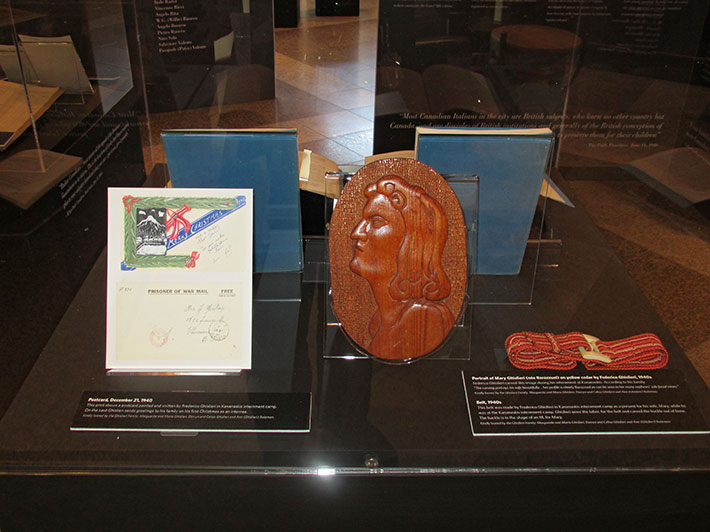Beyond the Barbed Wire: Experiences of Italian Canadians in WWII display case
Display case in the exhibition Beyond the Barbed Wire: Experiences of Italian Canadians in WWII. The display case contains prisoner of war mail, a wooden plaque and a belt.
At the left are two prisoner of war postcards sent by Federico Ghislieri to his family. The bottom postcard is typical of the type of letter sent between the interned men and their family and friends back home. The card on the top features a more elaborate design as it was sent during the Christmas season. What appears to be a woodcut of the mountains overlooking the internment camp is surrounded by festive greenery, ribbons and a blue banner that bears the greeting "Merry Christmas." Internees were allowed to write three letters and four postcards per month. The maximum length for letters was twenty-four lines and eight lines for postcards. Exceptions were made for those who ran businesses and had to respond to letters from the Custodian of Enemy Property. All camp letters were read by a censor. Contents deemed inappropriate were blacked out with ink. The same applied to incoming mail. Camp letters that were written in Italian were first translated into English before being read by a censor. Receiving mail was an important occasion for internees. For most, letters were the only contact they had with family.
The object at the centre is a wooden plaque created by internee Federico Ghislieri of his wife Mary (Barazzuol) Ghislieri carved in relief. As the surviving letters and postcards show, the men often thought of their families and girlfriends back home. This wood relief would have likely been created by Ghislieri as a reminder of his wife he left behind. Like many of the other internees, Ghislieri would have then brought this and other wooden objects home to his family. Other object created by internees and brought home to families include elaborate ships, mirrors, painted reliefs, jewellery boxes and serving trays.
The object at the right is a belt made by Federico Ghislieri as a present for his wife Mary while he was interned at Camp Kananaski. The buckle is in the shape of the letter "M" for Mary.
The Italian Cultural Centre Society (ICC) in Vancouver, BC created a project entitled A Question of Loyalty, which recognized and commemorated the experiences of those affected by the internment of Italian Canadians in British Columbia during World War II. The project included a play (Fresco, written by Lucia Frangione in collaboration with the BellaLuna Ensemble) a book (Injustice Served, the story of BC’s WWII Italian Enemy Aliens by Ray Culos), and an exhibition at the Italian Cultural Centre (Beyond the Barbed Wire: Experiences of Italian Canadians in WWII). The exhibition was on display at Il Museo at the Italian Cultural Centre in Vancouver, BC from March 8, 2012 to August 31, 2012.

















